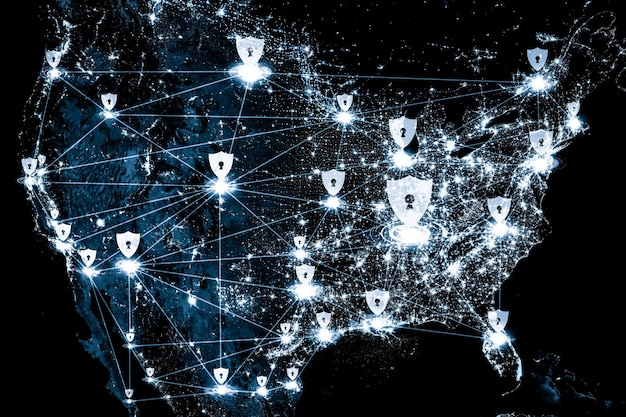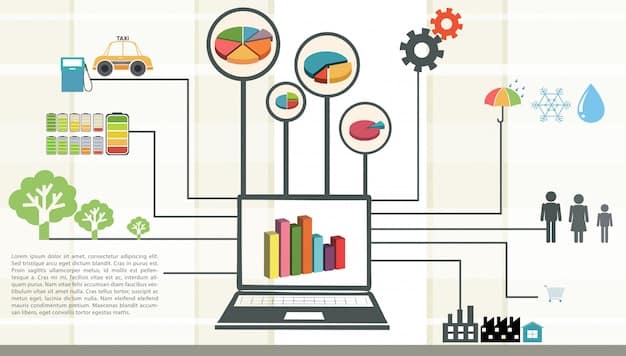Data Privacy Revolution: New Federal Regulations Arriving in January 2025

Breaking: New Federal Regulations on Data Privacy Set to Take Effect January 2025 are poised to reshape how businesses handle consumer data, mandating stricter compliance and potentially impacting data-driven strategies across various sectors in the United States.
Get ready for a significant shift in the digital landscape! Breaking: New Federal Regulations on Data Privacy Set to Take Effect January 2025 are coming, and they’re going to change how businesses across the U.S. handle your personal data. Are you prepared for what’s coming?
Understanding the Impetus Behind the New Data Privacy Regulations
The impending Breaking: New Federal Regulations on Data Privacy Set to Take Effect January 2025 stem from a growing concern over the use, misuse, and protection of personal data in an increasingly digital world. These regulations are a direct response to the demand for greater transparency and control over how information is collected, processed, and shared.
The existing patchwork of state laws and industry standards has proven insufficient to address the complexities of modern data practices. Thus, the federal government is stepping in to establish a comprehensive framework that ensures greater data protection for all citizens.

The Evolving Data Landscape
The world generates an astounding amount of data every single day. From social media interactions to online shopping habits, every click and transaction contributes to a vast sea of personal information. This data is invaluable for businesses, providing insights that drive innovation and marketing strategies. However, the collection and use of this data without proper safeguards can lead to privacy violations, identity theft, and other harmful consequences.
The new federal regulations aims to strike the right balance between enabling innovation and protecting individual rights in the digital age.
- Increased transparency on data collection practices.
- Strengthened rights for consumers to access, correct, and delete their personal data.
- Clearer guidelines for businesses on data security and breach notification.
The new regulations also reflect a growing global trend toward stronger data protection laws, inspired in part by the European Union’s General Data Protection Regulation (GDPR). By establishing a federal standard, the United States aims to catch up with international best practices and enhance its competitiveness in the global digital economy.
Ultimately, these new regulations represent a critical step towards establishing a more secure and equitable digital ecosystem, where individuals have greater control over their personal information.
Key Provisions of the New Federal Data Privacy Regulations
The Breaking: New Federal Regulations on Data Privacy Set to Take Effect January 2025 encompass a wide range of provisions designed to address various aspects of data protection. These provisions aim to provide individuals with greater control over their personal information while establishing clear guidelines for businesses on how to handle data responsibility.
Understanding these key provisions is essential for both consumers and businesses to navigate the new data privacy landscape successfully.
Right to Access and Correct Data
One of the cornerstones of the new regulations is the right for individuals to access their personal data held by businesses and to request corrections if the information is inaccurate or incomplete. This provision aims to empower individuals to ensure the accuracy and reliability of their personal information.
Businesses will be required to provide individuals with a readily accessible mechanism to request access to their data and make corrections. This process must be transparent and efficient to ensure that individuals can exercise their rights effectively.
- Businesses must respond to data access requests within a specified timeframe.
- Individuals have the right to know the sources of their personal data and the purposes for which it is being used.
- Businesses must implement reasonable security measures to protect personal data from unauthorized access or disclosure.
The right to access and correct data promotes transparency and accountability in data handling practices, fostering greater trust between individuals and businesses.
Another crucial element is the ability to delete personal data. Individuals can request the deletion of their data, subject to certain exceptions, such as when data is necessary for legal compliance.
Impact on Businesses Across Different Sectors
The Breaking: New Federal Regulations on Data Privacy Set to Take Effect January 2025 will have a far-reaching impact on businesses across various sectors, from healthcare and finance to retail and technology. Each sector will need to adapt its data handling practices to comply with the new regulations, which could require significant investments in technology, personnel, and training.
Businesses that fail to comply with the new regulations could face substantial fines and reputational damage, making it essential to prioritize data privacy compliance.

Healthcare Sector
The healthcare sector, which deals with highly sensitive patient data, will need to strengthen its data security measures to comply with the new regulations. Covered entities under the Health Insurance Portability and Accountability Act (HIPAA) will need to ensure that their data practices align with the federal data privacy standards.
Patients will have greater control over their health information, including the right to access, correct, and delete their data. This could affect how healthcare providers collect, use, and share patient information.
- Enhanced data encryption and access controls.
- Improved patient consent mechanisms.
- Regular data privacy audits and risk assessments.
These changes also present an opportunity for healthcare providers to build trust with their patients by demonstrating a commitment to data privacy and security.
For the financial sector, these regulations will introduce new standards for consumer data protection, affecting credit reporting, loan applications, and other financial services.
Preparing for Implementation: A Checklist for Businesses
As the Breaking: New Federal Regulations on Data Privacy Set to Take Effect January 2025 approach, businesses need to take proactive steps to prepare for implementation. This includes conducting a thorough assessment of their current data practices, developing a compliance plan, and training employees on the new regulations.
A systematic approach to implementation is essential to ensure a seamless transition and avoid potential compliance issues.
Assess Current Data Practices
Businesses should start by assessing their current data practices to identify areas where they need to make changes to comply with the new regulations. This includes mapping all data flows, identifying the types of personal data they collect, and evaluating their data security measures.
This assessment will provide a baseline for measuring progress and ensuring that all aspects of their data handling practices align with the new regulations.
- Conduct a comprehensive data inventory.
- Identify data gaps and vulnerabilities.
- Develop a data privacy policy.
This assessment should also involve consulting with legal and cybersecurity experts to understand the full scope of the new regulations and identify potential risks.
Implementing robust data security measures is crucial. Encryption, access controls, and regular security audits are essential to protect personal data from breaches.
The Role of Technology in Ensuring Data Privacy
Technology plays a critical role in ensuring data privacy and compliance with the Breaking: New Federal Regulations on Data Privacy Set to Take Effect January 2025. From data encryption and access controls to privacy-enhancing technologies, businesses can leverage technology to safeguard personal information and meet their regulatory obligations.
Investing in the right technology solutions can help businesses streamline their data privacy efforts and build trust with their customers.
Data Encryption
Data encryption is a fundamental technology for protecting personal data from unauthorized access. By encrypting data at rest and in transit, businesses can ensure that even if data is intercepted, it cannot be read or understood without the encryption key.
Strong encryption algorithms and key management practices are essential to maintain the effectiveness of data encryption.
- End-to-end encryption for sensitive communications.
- Data masking and pseudonymization techniques.
- Secure data storage solutions.
Data encryption is particularly important for businesses that handle highly sensitive information, such as healthcare providers and financial institutions.
Investing in privacy-enhancing technologies can help businesses collect and use data in a way that minimizes the risk of privacy violations.
Enforcement and Penalties for Non-Compliance
The Breaking: New Federal Regulations on Data Privacy Set to Take Effect January 2025 will be enforced by a designated federal agency, which will have the authority to investigate and prosecute violations of the regulations. Businesses that fail to comply with the new regulations could face substantial fines, legal actions, and reputational damage.
Understanding the enforcement mechanisms and potential penalties is crucial for businesses to ensure compliance and mitigate risks.
Enforcement Agency
The exact agency responsible for enforcing the new regulations is still being determined, but it is likely to be either the Federal Trade Commission (FTC) or a new agency specifically created to oversee data privacy. The enforcement agency will have the power to issue subpoenas, conduct investigations, and bring enforcement actions against non-compliant businesses.
The agency will also be responsible for educating businesses and consumers about the new regulations and providing guidance on compliance.
- Civil penalties and fines.
- Injunctive relief and cease-and-desist orders.
- Criminal charges for willful violations.
The enforcement agency will prioritize cases that involve significant harm to consumers or widespread violations of the regulations.
Implementing a robust data privacy program is the best way to avoid enforcement actions and maintain a positive reputation with consumers.
| Key Aspect | Brief Description |
|---|---|
| 🔑 Regulations Overview | Federal rules taking effect in January 2025, impacting data handling practices. |
| 🛡️ Key Provisions | Rights to access, correct, and delete data, plus data security guidelines. |
| 💼 Business Impact | Affects healthcare, finance, retail, tech, requiring compliance investments. |
| 罚 Non-Compliance | Substantial fines, legal action, and reputational damage for violations. |
Frequently Asked Questions
▼
The primary goal is to provide individuals with greater control over their personal data and to establish a consistent national standard for data privacy practices across the United States.
▼
These regulations are set to take effect in January 2025, giving businesses a period to prepare for the new requirements and ensure compliance with the new standards.
▼
These regulations will significantly impact all businesses that collect, process, or store personal data of U.S. residents, particularly those in sectors like healthcare, finance, and technology.
▼
Individuals will have the right to access, correct, and request the deletion of their personal data. They also have the right to know how their data is being used and shared by businesses.
▼
Businesses should conduct a thorough assessment of their data practices, develop a compliance plan, train employees, and invest in technology solutions that enhance data privacy and security.
Conclusion
The upcoming Breaking: New Federal Regulations on Data Privacy Set to Take Effect January 2025 herald a new era of data protection in the United States. By understanding the key provisions and taking proactive steps to prepare for implementation, businesses can not only ensure compliance but also build trust with their customers. For individuals, these regulations empower them with greater control over their personal data, fostering a more secure and transparent digital environment.





